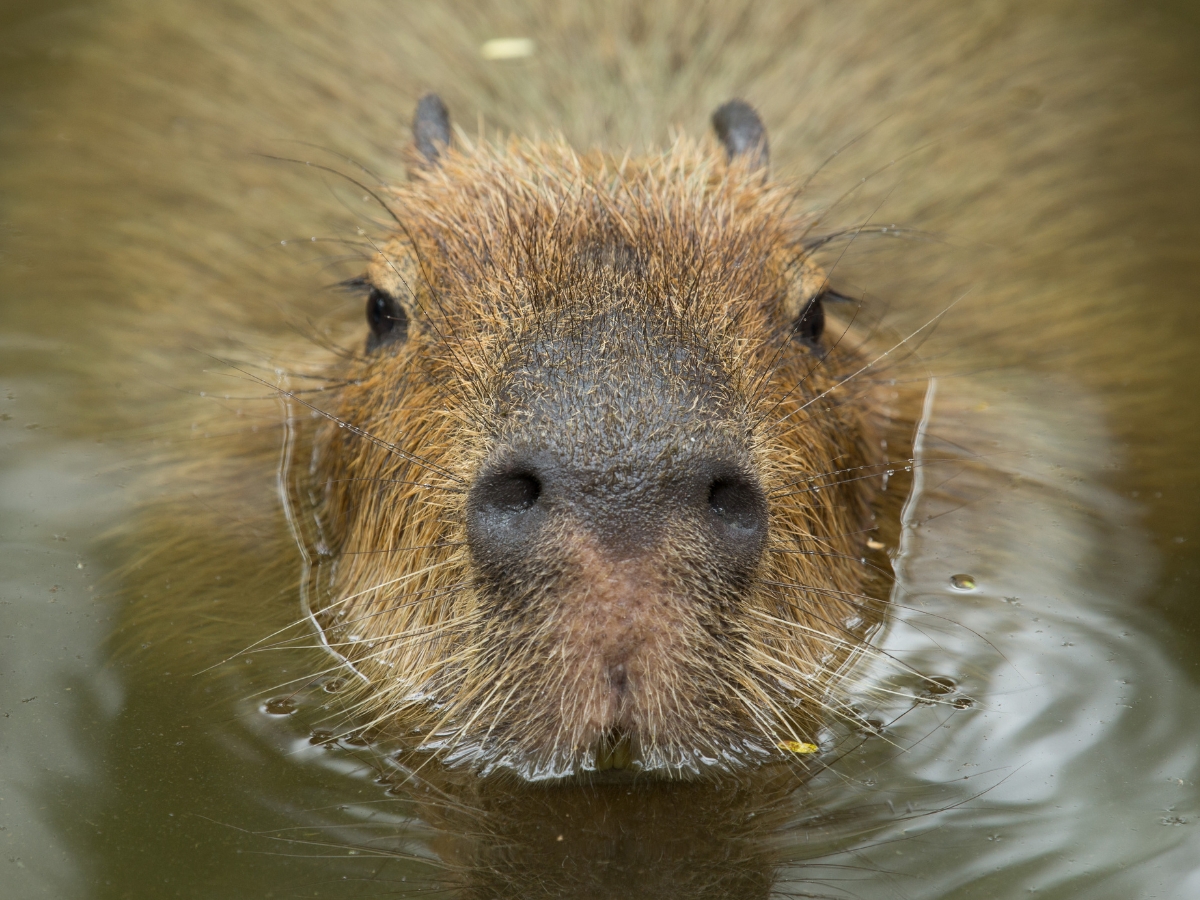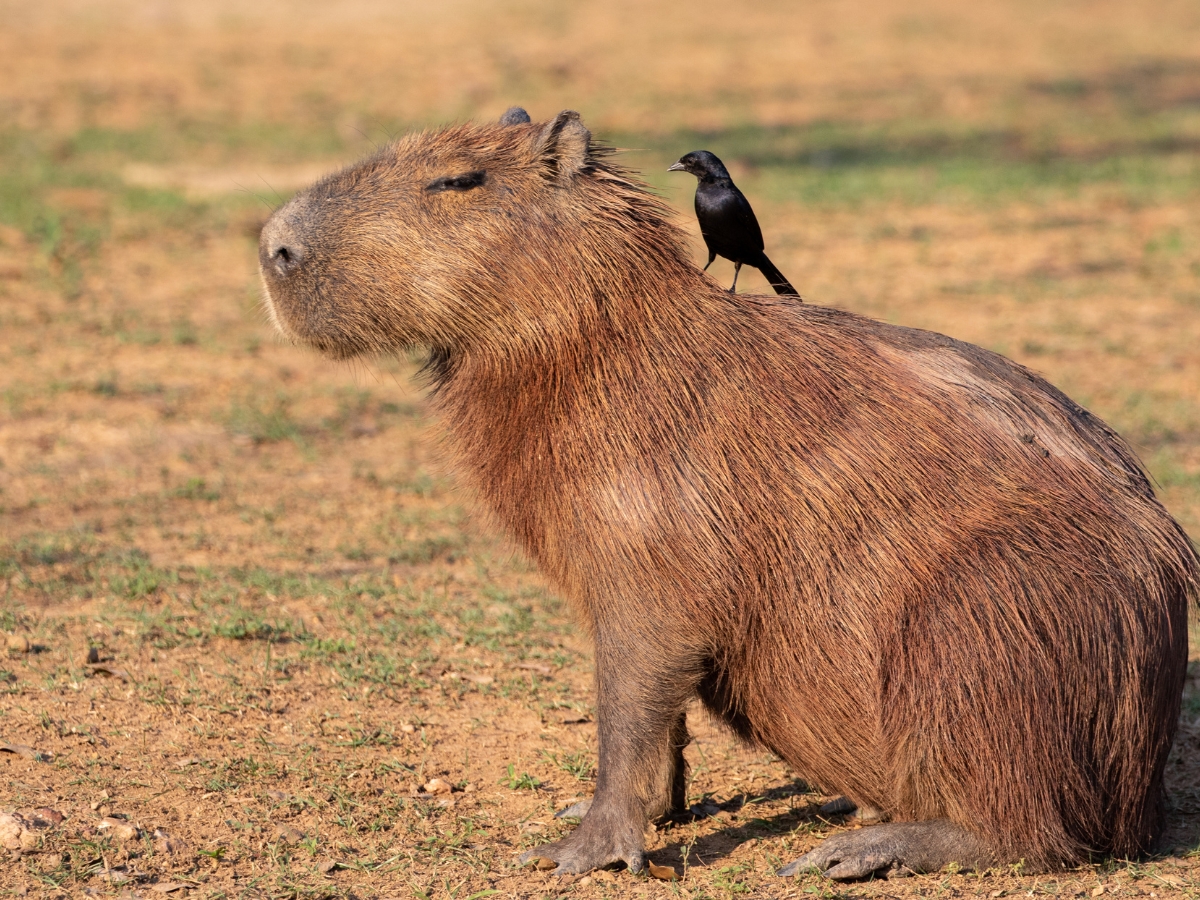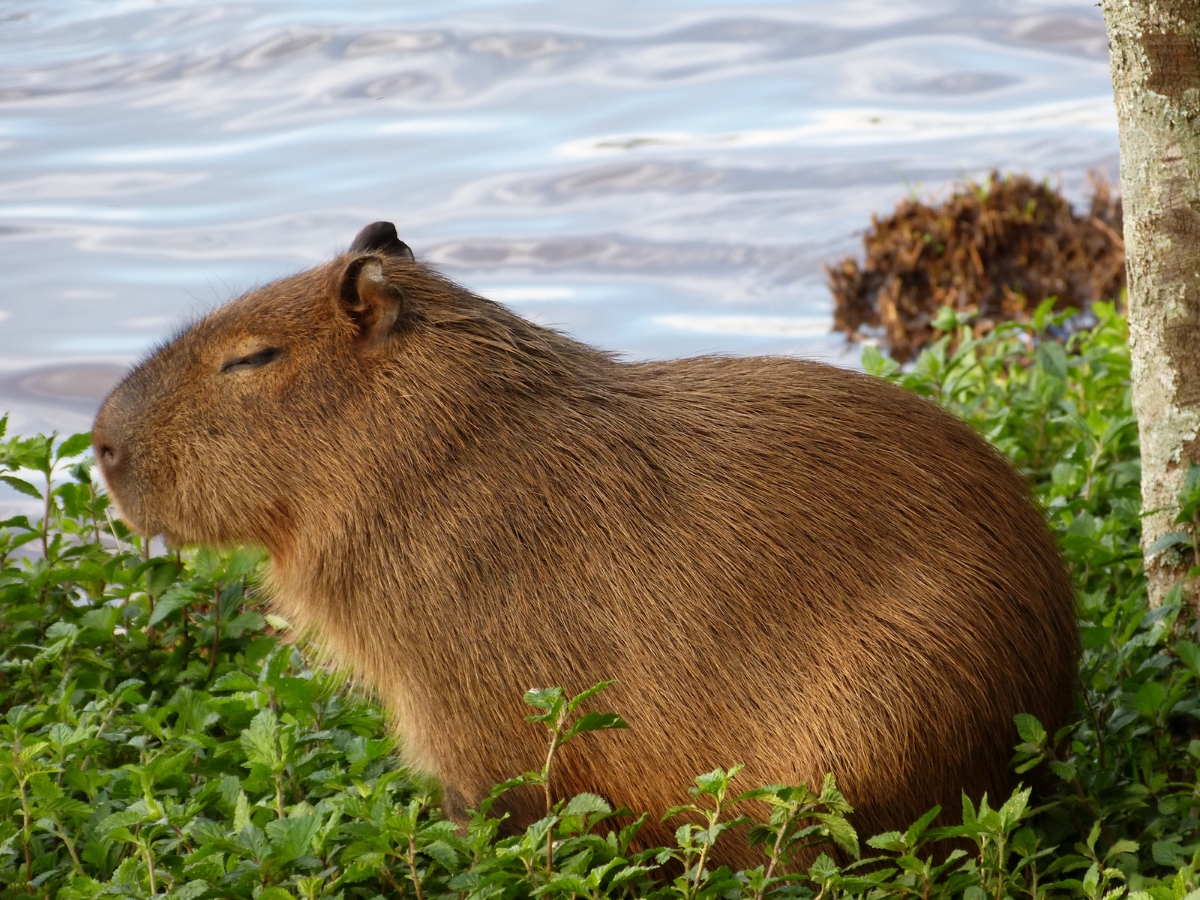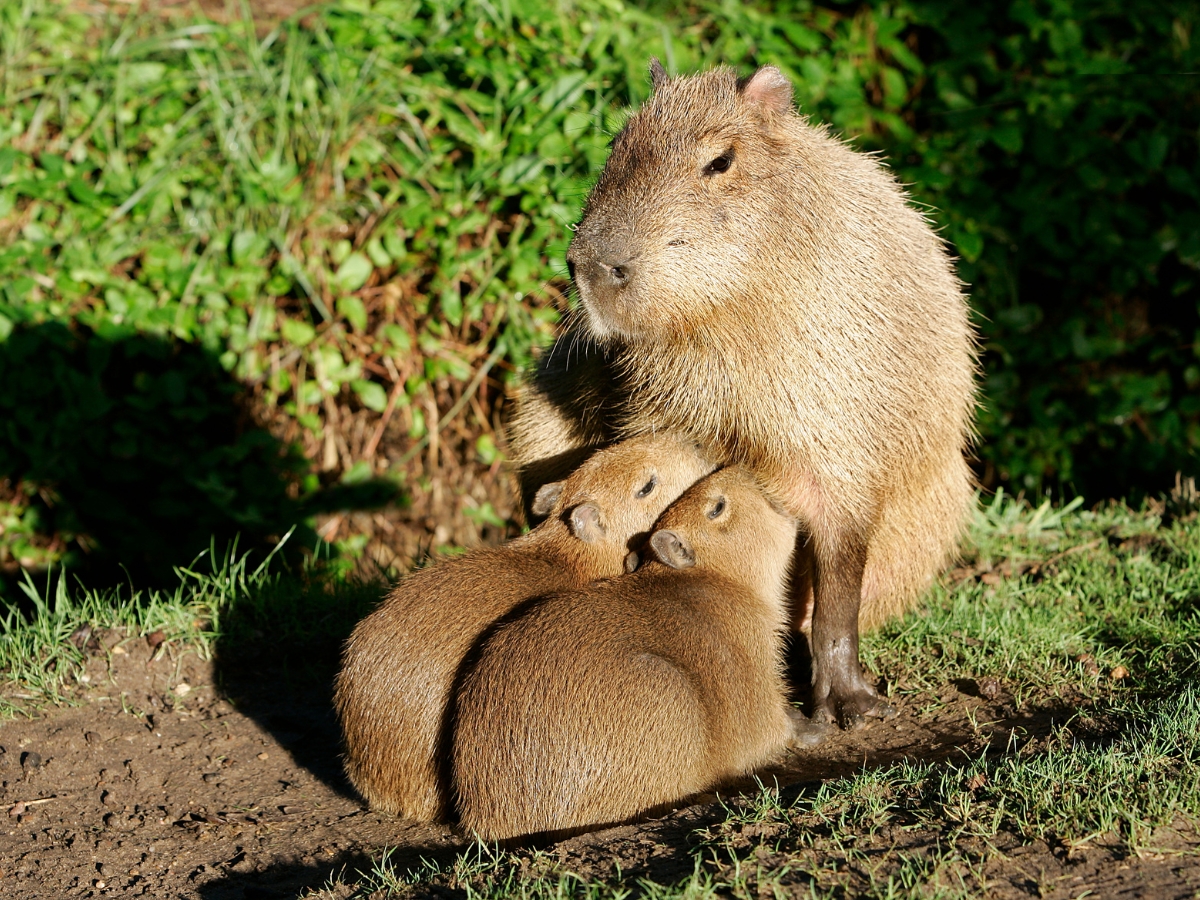Capybaras are the world’s most giant rodents native to South America. They are known for their social nature and docile temperament, making them popular pets in some areas. However, the legality of owning a capybara varies by state, and in California, it is strictly against the law to own one as a pet.
California classifies capybaras as exotic animals, which means they fall under specific regulations regarding ownership. Now, owning a capybara without proper permits and licenses is illegal in the Golden State. The fear is that capybaras could escape from their homes or enclosures and, as non-native species, significantly damage the local ecosystem.

Understanding Capybaras
Capybaras are the largest rodents in the world and are native to South America. They are semi-aquatic animals with webbed feet that allow them to swim well. Capybaras are herbivores and mostly feed on grasses, aquatic plants, and fruits. They are social creatures and live in groups of up to 20 individuals in the wild.
Behaviorally, capybaras are known for their calm and friendly nature. They are often kept as pets in some parts of the world, but owning them in California is illegal. Capybaras require large enclosures with access to water, as they enjoy swimming and soaking in water.
In the wild, capybaras have a lifespan of around 8-10 years, but in captivity, they can live up to 12 years. They are hunted for their meat and fur in some parts of South America, but they are not considered endangered.
Overall, capybaras are fascinating animals with unique characteristics. However, it is important to remember that owning them as pets is illegal in California and that they require specialized care and enclosures.

Capybaras as Pets
Capybaras are becoming increasingly popular as pets due to their friendly and social nature. However, owning a capybara as a pet is not legal in all states, including California. In California, owning an exotic pet like a capybara requires a permit and meeting certain requirements, including experience and providing adequate habitat and care.
Capybaras are social creatures and thrive in groups. It is recommended to keep them in pairs or small groups. They also require a lot of space to roam and exercise. A minimum of 400 square feet per capybara is recommended. They are also semi-aquatic and need access to water to swim and play.
In terms of diet, capybaras are herbivores and require a diet rich in grasses, hay, fruits, and vegetables. It is important to provide them with a balanced and nutritious diet to maintain their health. Regular veterinary care is also necessary to ensure their well-being.
Breeding capybaras is not recommended for inexperienced owners. It is important to understand the responsibilities and challenges of breeding capybaras before attempting it. Capybaras can also make a variety of sounds, including barks, whistles, and purrs, which can be loud and disruptive in a residential area.
In summary, while capybaras can make great pets for experienced and knowledgeable owners, it is important to research and understand the requirements and regulations before considering owning one.

Legal Aspects of Owning a Capybara in California
Owning a capybara in California is a complicated and possibly illegal matter. The state of California classifies capybaras as exotic animals, and they are subject to specific regulations regarding ownership. It is essential to understand the legal requirements and regulations surrounding capybara ownership in California before considering adopting one as a pet.
Permits and Licenses
To legally own a capybara in California, it is necessary to obtain the necessary permits and licenses. The process involves several steps and requirements to ensure that the owner can provide proper care and meet all legal obligations. It is illegal to possess a capybara without proper permits and licenses in California.
Legal Requirements
California has strict laws regarding exotic animal ownership, and capybaras fall under this category. It is illegal for Californians to own capybaras without proper permits and licenses. The state also requires that owners of exotic animals obtain a certificate of veterinary inspection and provide proper care and housing for the animals.
Ban on Capybara Ownership
The state of California has banned capybara ownership for several reasons. Capybaras are considered exotic animals, and their ownership poses risks to public health and safety. They can also cause significant damage to the environment and native wildlife if released or escaped into the wild.
Possession of Capybaras
It is illegal to possess a capybara in California without proper permits and licenses. The state imposes strict penalties for violating these regulations, including fines and imprisonment. It is essential to research and understand local laws regarding exotic pets, specifically those related to capybaras, before considering owning one.
In conclusion, owning a capybara in California is a complicated and possibly illegal matter. It is essential to obtain the necessary permits and licenses and follow all legal requirements and regulations to ensure proper care and safety for the animal and the public.

Challenges and Risks of Owning a Capybara
Owning a capybara can be a unique and rewarding experience, but it also comes with its own set of challenges and risks. Here are some things to consider before deciding to bring a capybara into your home.
Biting and Aggressive Behavior
Capybaras are generally docile animals, but they can become aggressive if they feel threatened or stressed. They may also bite if they feel cornered or uncomfortable. It’s important to socialize your capybara from a young age and provide them with plenty of space and enrichment to prevent aggressive behavior.
Diseases and Health Risks
Capybaras can carry diseases that can be transmitted to humans, such as salmonella and leptospirosis. It’s important to practice good hygiene and regularly clean your capybara’s enclosure to prevent the spread of disease. Additionally, capybaras have unique dietary needs and require a balanced diet to maintain their health.
Commitment and Expense
Capybaras can live up to 8-10 years in captivity and require a significant amount of time and attention. They also require a large enclosure and specialized care, which can be expensive. Before bringing a capybara into your home, it’s important to consider the long-term commitment and financial responsibility.
In conclusion, owning a capybara can be a rewarding experience, but it’s important to be aware of the challenges and risks involved. With proper socialization, care, and attention, capybaras can make loving and affectionate pets.
Housing and Environment for Capybaras
Capybaras are semi-aquatic animals that require a lot of space to roam and access to water. Therefore, their housing and environment must be carefully designed to meet their needs.
Water and Land
Capybaras are excellent swimmers and require access to water to regulate their body temperature and keep their skin healthy. They also need ample land to graze and move around. A pond or a large swimming pool can be an excellent addition to their enclosure. The water should be kept clean and fresh at all times, and the land should be free of any toxic plants.
Space
Capybaras are social animals and thrive in groups. They require a lot of space to move around and play. A minimum of 400 square feet per capybara is recommended for their enclosure. The enclosure should be spacious enough to allow them to run, play, and graze.
Enclosures
Capybaras are excellent climbers and diggers. Therefore, their enclosure must be secure and escape-proof. The walls should be at least six feet high and should be buried at least two feet underground to prevent them from digging out. The enclosure should also have plenty of shade and shelter to protect them from extreme weather conditions.
Property
Before bringing a capybara home, it is essential to check with the local authorities to ensure that it is legal to own one in your area. Capybaras are considered exotic animals and may require a special permit to own. Additionally, it is essential to ensure that your property has enough space to accommodate a capybara and that your neighbors are comfortable with the idea of having an exotic animal nearby.
In summary, capybaras require a lot of space, access to water, and a secure enclosure to thrive. If you are considering owning a capybara, it is essential to provide them with a suitable environment that meets their needs.
Comparison of Capybara Ownership Laws in Different States
Capybaras have become popular as pets over the years, but there are legal considerations to keep in mind before owning one. Different states have different laws surrounding capybara ownership. It is important to research the specific laws in your state before purchasing a capybara.
Here is a comparison of capybara ownership laws in different states:
- New York: Capybaras are illegal to own as pets in New York.
- Texas: It is legal to own a capybara in Texas as long as it is acquired legally and has a health certificate.
- Georgia: Private individuals can own capybaras in Georgia with permission from the state wildlife department.
- Illinois: Capybaras are illegal to own as pets in Illinois.
- Massachusetts: Capybaras are illegal to own as pets in Massachusetts.
- Alaska: Capybaras are illegal to own as pets in Alaska.
- Colorado: Capybaras are illegal to own as pets in Colorado.
- Connecticut: Capybaras are illegal to own as pets in Connecticut.
- Oregon: Capybaras are illegal to own as pets in Oregon.
- Vermont: Capybaras are illegal to own as pets in Vermont.
- Florida: Capybaras are legal to own as pets in Florida with a permit.
- Pennsylvania: A person must obtain a permit from the state’s Game Commission to keep a capybara as a pet in Pennsylvania.
It is important to note that even within states, regulations often vary. Counties, cities, and even neighborhoods may also have their own laws about keeping capybaras as pets. Therefore, it is crucial to research and follow all applicable laws and regulations before owning a capybara.
Conservation and Invasive Species Concerns
When it comes to owning a capybara in California, there are conservation and invasive species concerns that need to be taken into consideration. Capybaras are not native to California, and they are considered an invasive species in the state. Invasive species are non-native species that cause harm to the environment, economy, or human health.
The California Department of Fish and Wildlife has identified numerous actual and potential invasive species, including capybaras, from which they strive to protect California’s wildlands and waterways. Capybaras could escape from their homes or enclosures and do significant damage to the local ecosystem. Therefore, it is illegal to own a capybara in California without a permit from the Department of Fish and Wildlife.
Conservation efforts are also a concern when it comes to owning exotic pets like capybaras. Wild animals, especially non-native or exotic animals, are not suitable for domestication and can suffer from stress and other health issues in captivity. Moreover, native wildlife populations can be threatened by the introduction of non-native species, including capybaras.
In conclusion, owning a capybara in California is illegal due to conservation and invasive species concerns. It is important to protect native species and the environment from harm caused by non-native species. It is also essential to consider the well-being of wild animals and their suitability for domestication.
Alternatives to Capybaras as Pets
If you live in California and are considering getting a pet, you might be wondering what your options are besides capybaras. Fortunately, there are many other pets that can make great companions. Here are some alternatives to capybaras as pets:
Guinea Pigs
If you’re looking for a small, furry pet, guinea pigs are a great option. They are social animals and enjoy interacting with their owners. Guinea pigs are also relatively easy to care for and can live up to 8 years with proper care. They are available at most pet stores and can also be adopted from animal shelters.
Chinchillas
Chinchillas are another small, furry pet that make great companions. They are active and playful, and can live up to 20 years with proper care. Chinchillas require a dust bath to keep their fur clean, and they need to be housed in a large cage with plenty of toys and things to chew on. They are available at some pet stores and can also be adopted from animal shelters.
Gerbils
Gerbils are small, social rodents that make great pets. They are active and playful, and can live up to 5 years with proper care. Gerbils require a cage with plenty of space to run and play, as well as toys and things to chew on. They are available at most pet stores and can also be adopted from animal shelters.
Birds
Birds can make great pets for those who are looking for a pet that is more interactive than a small mammal. There are many different species of birds to choose from, each with their own unique personalities and care requirements. Some popular pet bird species include parakeets, cockatiels, and conures. Birds can be purchased from pet stores or adopted from bird rescues.
Reptiles
For those who are interested in keeping a pet that is a bit more exotic, reptiles can be a great option. Some popular pet reptiles include bearded dragons, leopard geckos, and ball pythons. Reptiles require specialized care, so it’s important to do your research before getting one. Reptiles can be purchased from pet stores or adopted from reptile rescues.
In conclusion, there are many great alternatives to capybaras as pets, including guinea pigs, chinchillas, gerbils, birds, and reptiles. Whether you choose to purchase a pet from a pet store or adopt one from an animal shelter or rescue, it’s important to do your research and choose a pet that is right for you and your lifestyle.
Resources for Prospective Capybara Owners
If you are considering owning a capybara as a pet in California, it is important to do your research and gather all the necessary resources to ensure that you are able to meet the unique needs of these animals. Here are some resources that may be helpful:
Department of Fish and Wildlife
The California Department of Fish and Wildlife (CDFW) is the agency responsible for regulating the ownership of exotic animals in California. They have strict regulations in place regarding the ownership of capybaras and other non-native animals. It is important to contact the CDFW to obtain the necessary permits and ensure that you are in compliance with all state laws and regulations.
Resources
There are several resources available online that can provide valuable information for prospective capybara owners. Some of these resources include:
- The Capybara Care website, which provides information on the care and maintenance of capybaras as pets.
- The North American Capybara Society, which is a non-profit organization dedicated to the welfare of capybaras and their owners.
- The California Capybara Owners Facebook group, which is a community of capybara owners in California who share information and resources.
It is important to note that owning a capybara as a pet is a significant responsibility and requires a substantial amount of time, effort, and resources. Before deciding to bring a capybara into your home, it is essential to carefully consider all of the factors involved and ensure that you are able to provide the proper care and environment for these unique animals.
Frequently Asked Questions
Is it legal to own a capybara in California?
No, it is not legal to own a capybara in California without a permit. California has strict regulations on owning exotic pets, which include capybaras. Enforcement agencies work to prevent illegal ownership and protect public safety.
What states allow capybara ownership?
Several US states permit residents to keep capybaras as pets. It is legal to own pet capybaras in states such as Alabama, Arizona, Arkansas, Connecticut, Delaware, Florida, Georgia, Illinois, Massachusetts, Oregon, and Vermont.
How can I obtain a license to own a capybara?
To obtain a license to own a capybara in California, one must meet certain requirements, including experience and providing adequate habitat and care. The process involves submitting an application, paying a fee, and undergoing an inspection by the California Department of Fish and Wildlife.
Why are capybaras illegal in California?
Capybaras are considered an invasive species in California, which is why they are illegal to own without a permit. The fear is that capybaras could escape from their homes or enclosures and, as non-native species, do significant damage to the local ecosystem.
What other rodents are legal to own in California?
California allows the ownership of domesticated rodents such as hamsters, guinea pigs, and domesticated rats and mice. However, it is important to note that even domesticated rodents can carry diseases and should be handled with care.
How much does it cost to own a capybara in California?
The cost of owning a capybara in California can vary depending on factors such as the cost of the animal, housing, food, and veterinary care. Capybaras require a large enclosure with access to water and a specialized diet. It is important to research and budget accordingly before considering owning a capybara.




